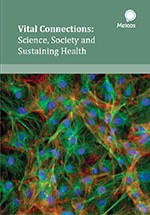Science, Society and Sustaining Health
Science and technology must urgently be deployed to help reverse negative health trends, linked to nutrition and environment, according to a report commissioned by the Wellcome Trust, and launched today. The report is the result of a twelve-month series of workshops, research, academic submissions and an expert panel that was co-hosted by the International Research Institute on Climate and Society and Mailman School of Public Health during Climate Week NYC last September.
Vital Connections: Science, Society and Sustaining Health explores how the growing human population is placing severe pressure on food, water, climate and biodiversity systems. It reviews how advances in health over the past seventy years are threatened by rising obesity, infectious diseases, respiratory diseases and immune dysfunctions – many of which are linked to environmental deterioration. The report explores how recent and extraordinary scientific and technological advances – and ‘Big Data’ in particular – must be used to prevent further decline in human health. For public health goals to be met global financial, political, social efforts need to be redirected in ways that address environmental impacts on health.
“The report gives a new perspective on how nutrition, environment and health are linked,” says author Sophia Tickell. “It highlights how human impacts on the climate, water systems and biodiversity are in turn impacting our access to fresh water, ability to feed ourselves and breathe freely. We need to take urgent action to reverse these trends, using the science and technology at our disposal. But to improve health we also need to manage our affairs differently.”
As part of the sustaining health dialogue, IRI’s Madeleine Thomson, helped organize a multi-stakeholder consultation in New York to coincide with the UN Secretary General’s Climate Summit and Climate Week. The panel helped highlight the diverse ways that climate and health interact.
“Climate is both a challenge and a resource,” says Thomson. “While climatic extremes can bring chaos to our food and health systems, an understanding of the climate can help protect us from adverse events. Furthermore, choices we make today with regard to our diet have long term implications for the health of the planet. A sustainable low meat diet has major benefits for both individuals and ecosystems.”
The document highlights five steps to make this happen:
- Corporations, NGOs, governments and academics must work across institutional, sector and disciplinary boundaries
- Markets, politicians and individuals must think and act in longer timeframes
- Powerful individuals and institutions must commit to new, collaborative leadership
- Young and marginalized people must be included in the design of any solutions
- Citizens must engage in public debate on how to address the gap between what it is possible to do and what it is ethical to do
Wellcome Trust commissioned Meteos to write the report as an input to its Sustaining Health work, which links nutrition, health and environment. Meteos convened a Core Group of experts from academia, NGOs, social enterprise, business and government to contribute to the Dialogue, which ran from October 2013 to November 2014.


You must be logged in to post a comment.